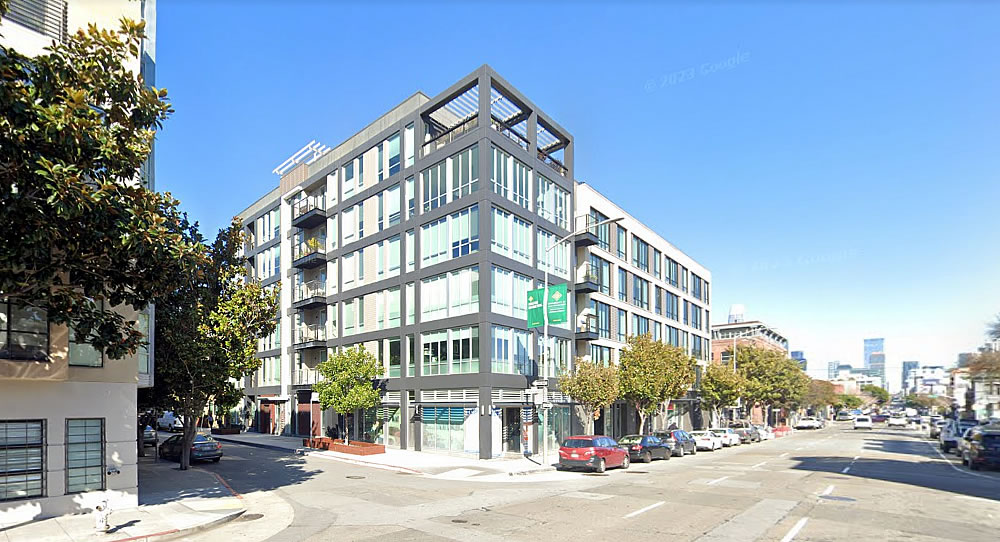Speaking of “over asking” sales in this “surging” market, the re-sale of the two-bedroom condo #219 at 99 Rausch has just closed escrow with a contract price of $885,000, which is officially $135,000 “over asking!” according to all industry stats and aggregate market reports and scores as the 947-square-foot unit was re-positioned for a “luxury live auction” and re-listed on the MLS for $750,000 this past February.
Purchased for $1,324,000 in February of 2019, however, the “over asking” sale represented a net 33.2 percent drop in value for the contemporary two-bedroom, two-bath unit with a courtyard-facing patio and deeded parking with an EV charger in the building’s garage on an apples-to-apples basis over the past five years.







So its quoted as 947 SqFt in marketing materials, plus or minus load factor. So it sold for $934/SqFt. That’s the real number for condos, right?
From last month, Pace of Home Sales in S.F. Drops, Slowest in Over 7 Years, final part of the ‘graph:
So perhaps roughly $934 per ft.² isn’t so bad a result. I still don’t think the “luxury live auction” gambit did much except signal that the seller was motivated to unload.
The sale price change seems consistent with the increased cost of debt between the two transaction dates.
Not only that, but the huge price drop is also consistent with the air letting out of a massive speculative asset bubble that had been blown partly by years of an unprecedented decreased cost of debt.
and the fact that westen soma has turned for an up and coming neighborhood to a complete drug cesspool
But similar sales price changes are not happening nationally.
The end of ZIRP and QE is affecting many national markets, mostly those that benefited the most from the years of loose monetary policy designed to blow the speculative asset bubbles the Fed is now apparently trying to clean up after.
SF RE is declining faster than the nation as a whole, for precisely the reason some of us here have been pointing to for years: decades of building ever more expensive mostly 1BRs marketed to affluent young delivery app coders, foreign capital flight, and flippers wrought a historic supply glut of specific unit types most suited to transients instead of rooted families. Now that “demand” for those types of units is evaporating and the market targets are exiting as fast as (or even faster than) the working class families they helped defenestrate, who remains to overpay for the thousands of vacant units in “The Hub,” “East Cut,” and other gentrified fronts in the local real estate class war?
The answer (to the question posed in the final sentence): fewer and fewer buyers, which means that prices will have to decrease. At this point those of us who aren’t in denial and aren’t trying to deflect blame onto The City’s political leaders for what is necessary demand destruction are just guessing what the rate of decrease is or will be in the near term, until The Fed starts cutting interest rates. Based on the fact that The Fed’s preferred inflation measure rose 2.8 percent in March from a year ago, more than expected, it isn’t plain when those rate cuts will actually arrive.
Not that many national makets. Many MSAs have actually increased in value over the same selected time periods compared to San Francisco while San Francisco has decreased and in some specific areas, values have decreased significantly. Some other areas of the country are safe, desirable and do not have the problems that San Francisco has. Let me know if you would like some examples. It is really hard to find values dropping >30% vs. pre-Covid outside of San Francisco. You may be able to hand pick some other gems with questionable public policies but it will still be challenging.
No third beer for you this time.
You didn’t say if those other MSAs were starting from a significantly lower relative base, I suspect that most of them did. As far as home ownership is concerned, S.F.’s market is in a pretty rarefied group, where the median income for working households isn’t enough to even qualify for buying the lower-than-median home. Other MSAs have property affordable to most working households, but in S.F., most property is only affordable to those near the top of the income distribution, and that strata is dominated by jobs at companies in largely a single industry, an industry that is — as it happens — highly amenable to remote work. Workers in those jobs are taking advantage of that fact and working remotely, which means property values here are adjusting downwards.
San Francisco, even with it’s problems being highlighted nightly on Fox News, is plenty desirable, the main problem is that it’s too expensive. Folks have been fleeing to less pricey locales, many of which are the MSAs that have actually increased in value over the same time periods that you have in mind.
Great analysis, 2Beers … I’ve been traveling and have to say that SF is unique in the worst way – so much crap real estate that is really unsuitable for anyone but the itinerant population you mentioned…. And now so many families have already been shoved out.
Btw it takes an act of god to get the city to enforce against full time Airbnb hotel rooms – which is what many of these ridiculous 1br dwelling are turned into when they don’t sell
Along with the unit in the Tenderloin (sorry, Little Saigon), the street scene has deteriorated significantly. In the past it might have been reasonable to bet on long term improvement. All bets are off now.
Brahma (incensed renter),
My friend, the issues specific to San Francisco are covered on multiple media outlets beyond Fox News including local news. So while it is easy for you to focus on the above average (actually one of very few) decline in real estate values related to SF on specific news outlets, it is not well supported.
It is also nice to say that SF real estate is declining in value because it was too expensive originally and that many of the buyers who could afford it have left, also that the exodus was related to the tech sector. While that may be true in some cases, unfortunately for your arguement other MSAs have had better experiences with their main industries returning back to the city.
Please let me know if you would like some examples of media outlets outside of Fox News exposing San Francisco’s many challenges, self-inflicted or not.